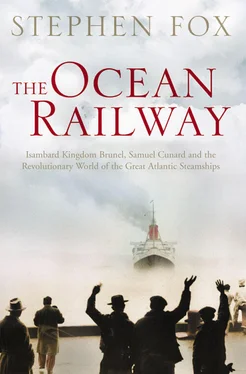On that same day, across the ocean, the Halifax Novascotian printed its first announcement of the original Admiralty tender. (This delay of two months itself argued for adding steam power to the Atlantic mail.) In its headlong rush towards steam, the Admiralty was not allowing enough time for any proposals from the colonies. Sam Cunard nonetheless caught the next sailing packet from Halifax to England, unaware of recent developments. He did not yet know about the Great Western offer, its rejection by the government, or the expired deadline for other bids. He had only his own secret plan.
It was not, as it happened, the best time for Cunard to embark on a grand, risky new venture. The British economic crash of 1837 was still lingering over the country, tightening money markets, headed towards a major industrial depression. Cunard was himself overextended at home. George Renny Young, an influential lawyer and politician in Halifax, had drawn Cunard into a grandiose scheme to buy up hundreds of thousands of acres on Prince Edward Island. It brought him a touchy alliance with the Young family, leaders among the local oligarchs. (Agnes Renny Young, the family matriarch, warned her son George about Cunard’s ‘immense’ power: ‘ People fear himso much that they keep quiet and submit. He never was friendly to our family and will give you a blow where he can.’) Sam took a one-third interest in the land company and soon fought with George Young over the appointment of a company attorney. Young wanted his brother Charles, and Sam favoured his son-in-law James Horsfield Peters, who had married his eldest daughter, Mary. Family loyalties, always a tugging allegiance for Cunard, quickly poisoned the venture. ‘ You seem afraidthat I intend making a family party of this,’ Cunard wrote to Young in August 1838. ‘I trust I am sufficiently well known in this community to be believed when I assert that I had no intention of taking advantage.…I must now decline any further correspondence on the subject.’ After Cunard pulled rank, James Peters got the job as attorney, but Young nursed the grievance. The quarrel was only resolved when Cunard bought out Young’s shares in the spring of 1839. That left Sam, at this crucial moment, heavily mortgaged and cash-poor for investing in any major new enterprise. (Young and his family became enemies with long memories and later found a damaging chance to strike back at the Cunards.)
What, then, was nonetheless drawing Cunard towards transatlantic steam? Fifty-one years old, still in his prime, he remained as active and ambitious as ever. After his long career in ships and shipping, and (since the Royal William) in steam vessels as well, he had in some ways outgrown Halifax and craved a larger arena. An Atlantic steamship line was a logical extension of his lifework. He knew from weary experience the limitations of the British government’s mail packets; he had been enduring their slow, precarious service for almost two decades. (On a trip to England in 1831, Cunard had fallen on a packet’s deck and broken his arm.) To compete with the fast New York packet lines, the government brigs had been redesigned for more speed. But that made the ships less stable and too prone to foundering at sea. ‘ Almost every year, two hundred or three hundred people were lost in the mail packets, and at last they got the designation of “coffins”,’ Cunard said later. ‘I came home in those ships very frequently, and of course felt the danger and discomfort of coming in them, and I have lost a very great many friends in them.’ In January 1839, even as Cunard was crossing to England, that month’s westbound Falmouth packet sailed away and just disappeared. ‘ I lost fiveor six intimate friends,’ Cunard recalled of that vanished ship. ‘They were never heard of.’ This latest packet disaster invested his mission with an immediate, sharper edge and made its own human case for adding steam’s protecting power to the ocean mail.
Along with these personal motives, in a larger sense Cunard was acting from patriotic or nationalist incentives. Given his American parentage and his years of business dealings down the coast of New England to New York, he had strong ties to some Yankee ports and individuals. Yet his family had, after all, been forced into unwanted exile by the American victors in the Revolution. He typically regarded his American commercial associates with a goading mixture of fear and respect; over his entire career, nothing else so motivated him as competing with Americans and striking back at them. The New York packet lines, faster and more reliable, had taken most of the transatlantic mail away from the Admiralty’s ships. At a time of strained relations between the two countries, British mail depended largely on American vessels: a galling vulnerability that in part explained the Admiralty’s sudden sprint towards steam. As a Canadian, British subject, and descendant of American Loyalists, Cunard inevitably savoured the prospect of taking the mail back from the aggressive Yankees.
Arrived in London, he took lodgings at a Piccadilly hotel and worked from a desk at the General Mining Association’s office in nearby Ludgate Hill. His GMA connections, his two decades of carrying the mail between Boston, Halifax and St John’s, Newfoundland, and his thriving agency for the East India Company’s tea trade in eastern Canada all eased his way through Whitehall and financial offices in the City. He also carried a useful letter of introduction from Sir Colin Campbell, the royally appointed lieutenant governor of Nova Scotia. ‘ I have alwaysfound him one of the firmest supporters of the measures of the Government,’ Campbell had written, ‘and his being one of the principal Bankers and Merchants and Agent of the General Mining Association, and also Commissioner of Light Houses, gives him a great deal of influence in this community.’
Cunard’s planwas simple and audacious: instead of a monthly mail service, he intended to run enough ships to maintain a weekly service across the ocean and thus cut more deeply, directly into the frequent sailings of the New York packets. He had taken the Admiralty’s tender and quadrupled it. Within days of his arrival in London, he was meeting with Charles Wood at the Admiralty and Francis T. Baring at the Treasury. ‘ I submittedthat by going once a week the whole of the letters would be taken by our steamers, and the American packet ships that had previously carried the letters would cease to carry them,’ Cunard explained later. Wood and Baring ‘entertained my plan; and they took a great deal of pains…spent many hours at different times in going through the calculations and routes with me.’ The three parties eventually split the difference between Cunard’s plan and the Admiralty tender by settling on a mail service to run twice a month at the outset.
Cunard’s formal proposal on 11 February committed to paper what they had already thrashed out in conversation. ‘ I hereby offerto furnish Steam Boats of not less than three hundred Horse power,’ he wrote, ‘to convey the mails from a port in England to Halifax and back twice in each month.’ In addition, he would provide steamboats of half that power for carrying the mail between Halifax and Boston, connecting his service to the United States but saving the extra two hundred miles to continue to New York. ‘Should any improvements in Steam Navigation be made,’ he added, with a nod to the onrushing pace of technical progress, ‘…which the Lords of the Admiralty may consider as essential to the Service, I do bind myself to make such alterations and improvements as their Lords may direct.’ For these forty-eight annual transatlantic voyages he asked £55,000 a year. (The Great Western company had wanted £45,000 for twenty-four trips.) The Admiralty and Treasury moved quickly. Within two weeks of the formal proposal, long before any public announcement, word was passingaround London’s political and financial circles that Samuel Cunard of Halifax had the contract.
Читать дальше












